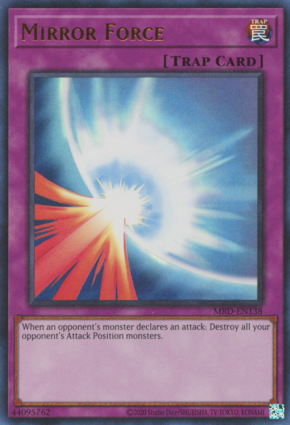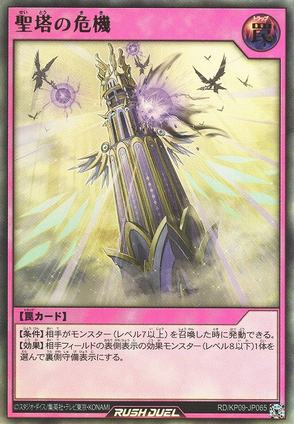Difference between revisions of "Normal Trap Card"
BritishCynic (talk | contribs) |
(Tag: New user edit) |
||
| (80 intermediate revisions by 41 users not shown) | |||
| Line 1: | Line 1: | ||
| − | Normal Trap Cards are [[Spell Speed]] 2, | + | [[File:Normal.svg|thumb|Icon for Normal Trap Cards used in some video games.]] |
| + | |||
| + | '''Normal Trap Cards''' (Japanese: {{Ruby|通|つう}}{{Ruby|常|じょう}}{{Ruby|罠|トラップ}}カード ''Tsūjō Torappu Kādo'') are a subcategory of [[Trap Card]]s. | ||
| + | |||
| + | In ''[[Yu-Gi-Oh! Rush Duel]]'', it is the only category of Trap Cards. | ||
| + | |||
| + | ==Characteristics== | ||
| + | As a Trap Card, Normal Trap Cards must first be [[set]] before they can be activated, and cannot be activated in the same turn they are set. Normal Trap Cards feature the default Trap Card [[Spell Speed]] of [[Spell Speed 2]]. | ||
| + | |||
| + | After activation and resolution, Normal Trap Cards are sent to the [[Graveyard]]. | ||
| + | |||
| + | ==Interactions with effects== | ||
| + | Card effects can make Normal Trap Cards: | ||
| + | * Activate themselves in the same turn they are set. (e.g.: "[[The Phantom Knights of Shade Brigandine]]") | ||
| + | * Activate themselves from the hand. (e.g.: "[[Delta Crow - Anti Reverse]]") | ||
| + | * Re-set themselves on the field after activation and resolution, instead of sending themselves to the GY. (e.g.: "[[Subterror Final Battle]]") | ||
| + | * Remain face-up on the field after activation, for example by letting them become [[Treated as Equip Card]]s (e.g.: "[[Blast with Chain]]") | ||
| + | |||
| + | ==Example== | ||
| + | {{Multiple image|align=center|total_width=600|height=480 | ||
| + | | image1 = {{Show card image|Mirror Force|filename=1}} | ||
| + | | caption1 = "[[Mirror Force]]", a Normal Trap Card in the ''[[TCG]]''/''[[OCG]]'' | ||
| + | | image2 = {{Show card image|Crisis at the Sacred Tower|filename=1}} | ||
| + | | caption2 = "[[Crisis at the Sacred Tower]]", a Normal Trap Card in ''[[Rush Duel]]'' | ||
| + | }} | ||
| + | ==In other languages== | ||
| + | {{In other languages | ||
| + | | ja_name = {{Ruby|通|つう}}{{Ruby|常|じょう}}{{Ruby|罠|トラップ}}カード | ||
| + | | ja_romaji = Tsūjō Torappu Kādo | ||
| + | | fr_name = Carte Piège Normal | ||
| + | | de_name = Normale Fallenkarte | ||
| + | | it_name = Carta Trappola Normale | ||
| + | | ko_name = 일반 함정 카드 | ||
| + | |ko_rr=Ilban Hamjeong Kadeu | ||
| + | | zh_name = 通常陷阱卡 | ||
| + | |zh_pinyin=Tōngcháng Xiànjǐngkǎ | ||
| + | | es_name = Carta de Trampa Normal | ||
| + | | pt_name = Card de Armadilha Normal | ||
| + | }} | ||
| + | ==See also== | ||
| + | *[[List of Normal Trap Cards]] | ||
| + | *[[List of Normal Trap Card support cards]] | ||
| + | *[[List of Normal Trap Card anti-support cards]] | ||
| + | {{Card types}} | ||
| + | |||
| + | [[Category:Types of Trap Cards]] | ||
Latest revision as of 02:51, 28 May 2024
Normal Trap Cards (Japanese:
In Yu-Gi-Oh! Rush Duel, it is the only category of Trap Cards.
Characteristics[edit]
As a Trap Card, Normal Trap Cards must first be set before they can be activated, and cannot be activated in the same turn they are set. Normal Trap Cards feature the default Trap Card Spell Speed of Spell Speed 2.
After activation and resolution, Normal Trap Cards are sent to the Graveyard.
Interactions with effects[edit]
Card effects can make Normal Trap Cards:
- Activate themselves in the same turn they are set. (e.g.: "The Phantom Knights of Shade Brigandine")
- Activate themselves from the hand. (e.g.: "Delta Crow - Anti Reverse")
- Re-set themselves on the field after activation and resolution, instead of sending themselves to the GY. (e.g.: "Subterror Final Battle")
- Remain face-up on the field after activation, for example by letting them become Treated as Equip Cards (e.g.: "Blast with Chain")
Example[edit]
"Crisis at the Sacred Tower", a Normal Trap Card in Rush Duel
In other languages[edit]
| Language | Name | Romanized |
|---|---|---|
| French | Carte Piège Normal | |
| German | Normale Fallenkarte | |
| Italian | Carta Trappola Normale | |
| Portuguese | Card de Armadilha Normal | |
| Spanish | Carta de Trampa Normal | |
| Japanese | Tsūjō Torappu Kādo | |
| つうじょうトラップカード (kana) | ||
| 通常罠カード (base) | ||
| Korean | 일반 함정 카드 | Ilban Hamjeong Kadeu |
| Chinese (Traditional and Simplified) | 通常陷阱卡 | Tōngcháng Xiànjǐngkǎ |

